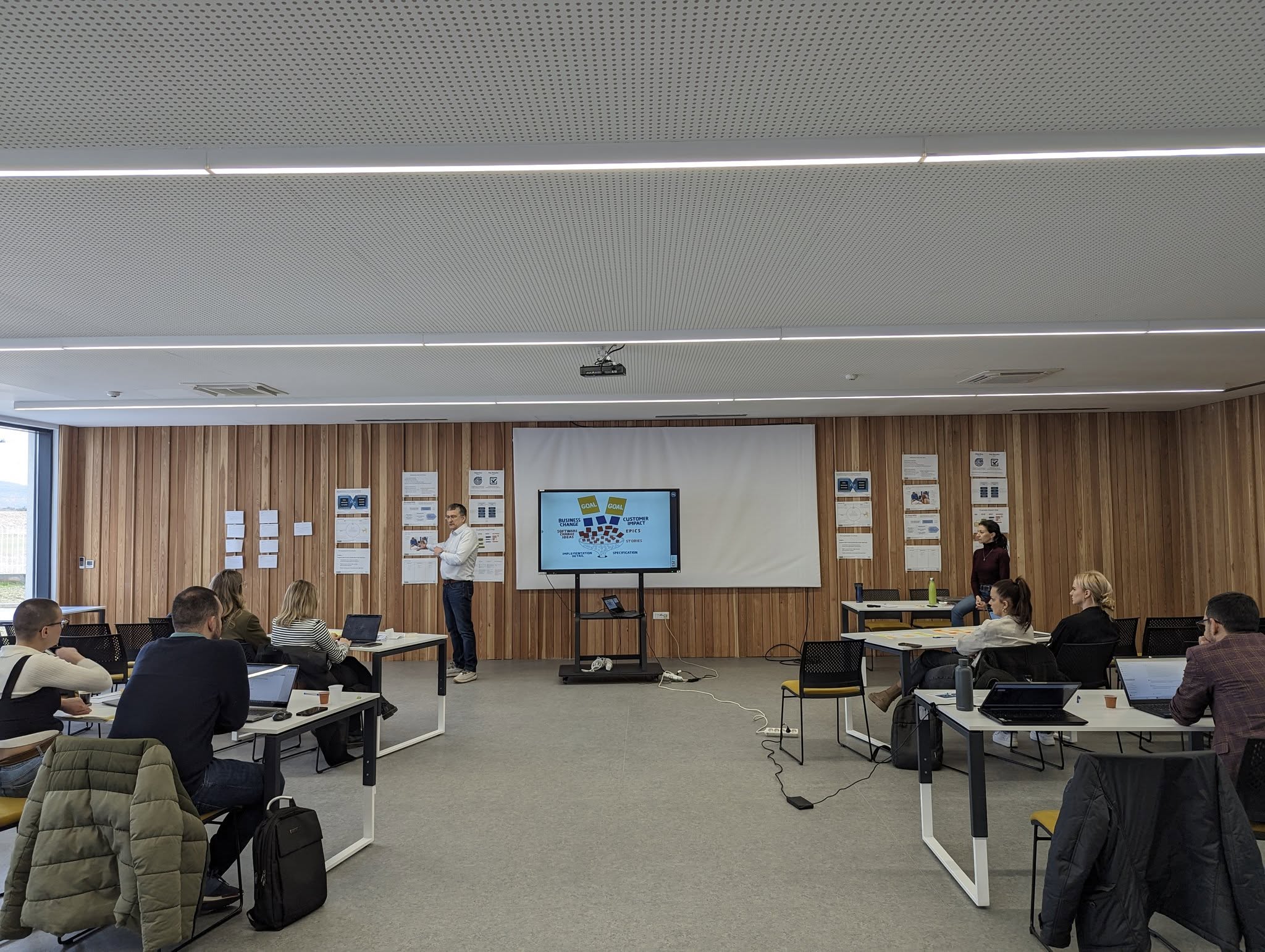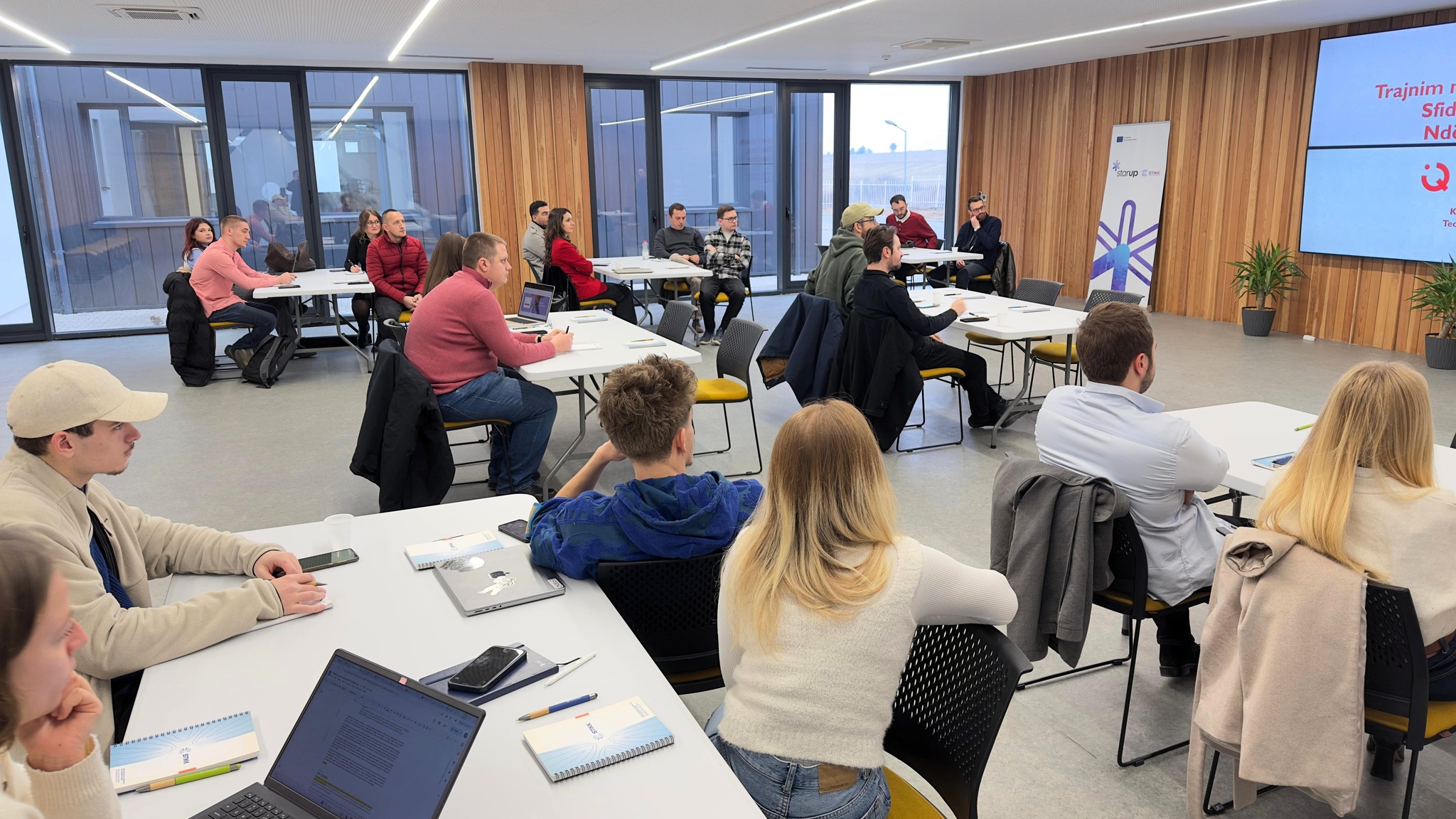
The European Union strongly supports the development of information and communication technologies across the Western Balkans region, as a robust ICT sector drives faster economic growth, facilitates easier and more efficient global connectivity, and enhances the cybersecurity of both the state and its citizens. In line with these goals, the Kosovo Association of Information and Communication Technology (STIKK), with over 120 members, has earned the trust and support of the EU.
Its members include start-ups, small and medium-sized enterprises, major ICT service providers, training centres and outsourcing companies, digital marketing agencies, and cybersecurity firms. STIKK’s mission, they explain, is to strengthen and promote Kosovo’s ICT industry and support its competitiveness so that it becomes a driver of economic growth and job creation.
“We design and conduct research, and seek ways to accelerate the development of start-ups and digital skills. Our aim is to combine industry knowledge, education reform, and support for innovation into a comprehensive approach to ICT sector development in Kosovo. Over the years, we have built strong partnerships with donors such as the European Union, the Grand Duchy of Luxembourg through LuxDev, the Austrian Development Agency, USAID, and others”, explains Executive Director Vjollca Çavolli.

They emphasise that the European Union has been a key partner in supporting STIKK’s mission and activities.
“Through the START UP project, funded by the EU, we established TechPark Prishtina, the first accelerator centre for ICT-focused start-ups in Kosovo. This facility now serves as a central hub where start-ups receive mentorship, participate in events, and connect with local and international partners. The EU grant enabled us to provide direct financial assistance, facilitate B2B connections between Kosovan and European companies, support our start-ups’ participation in international events such as Slush in Helsinki and the Vienna Start-up Festival, and offer a broad range of training programmes that have enhanced the export readiness of local ICT companies”, says Çavolli, noting that the EU’s contribution has been crucial in accelerating the development of Kosovo’s ICT sector and strengthening its ties with European markets.
She explains that, in the previous period, they awarded seed funding grants of up to €10,000 to fifteen promising start-ups and provided intensive, tailored mentoring in areas such as finance, business management, legal compliance, intellectual property rights, and IT digitalisation.

“One of the supported start-ups secured a €160,000 investment from a foreign investor in Mexico following participation in an online event organised by STIKK. Others benefited from customised legal or financial mentoring that helped them overcome critical challenges and position themselves for growth”, says Çavolli, emphasising that these stories demonstrate how grants, mentoring, and international exposure can transform the potential of young companies into tangible business success.
The Lobby Boy Team is one of STIKK’s beneficiaries – they received both a grant and targeted mentoring.
“We received training on market expansion and marketing, which helped us focus on strategies and logistics for successfully entering new international markets and increasing the company’s visibility within the industry. Our collaboration with STIKK has been transformative and means a great deal to us. Thanks to the connections and support they provided, we secured an investor, which stabilised our business and created momentum for exploring and expanding into foreign markets – our strategic goal”, explains Arben Jonuzi from the company.
He considers STIKK’s engagement in Kosovo’s IT industry to be exceptional.

“They are a vital driving force – not only by providing direct support through grants and mentoring but also by creating platforms that advance the entire ecosystem. A great example is the organisation of major technological events such as the KosICT 2025 B2B Matchmaking Event. These events are crucial as they provide opportunities to learn from the best in the industry, find collaboration partners, and connect with potential investors. Most importantly, they offer consistent, practical support essential for the growth of technology-oriented start-ups in the region”, says Jonuzi.
In July 2025, the European Commission in Kosovo announced the completion of the ICT for Kosovo’s Growth project, which trained and certified more than 3,100 young people in Java programming, cybersecurity, web development, Python, Big Data Analytics, Cloud Computing, Machine Learning, and Artificial Intelligence. The project was funded by the EU, but the credit for its achievements goes to the Ministry of Economy of the Government of Kosovo, WEglobal, EPM, Prishtina REA, STIKK, ICK, and other partners.
STIKK’s plans are to ensure that young people in Kosovo gain practical skills, that more women engage in the sector, to expand its support to enterprises, enhance the experience of TechPark Prishtina and its grant and mentoring programmes, and raise Kosovo’s international profile by further developing the KosICT Festival, which it has organised since 2011. This year, the festival was held on 11–12 October, under the slogan Community and connectivity enable innovation.
STIKK also collaborates with the Government of Kosovo on developing policies for digitalisation and innovation and improving the workforce.
“We provide research-based recommendations such as the IT Barometer and Skills Gap Analysis, which identify where reforms are needed. We cooperate with the Ministry of Education, Science, Technology and Innovation on integrating ICT skills into vocational education, and we support the National Qualifications Institute in accrediting ICT training providers, which enhances the quality and credibility of education in the country”, explains Çavolli, highlighting that the association’s network of members and expertise helps the sector grow sustainably and contribute to Kosovo’s socio-economic development.

They emphasise that the European Union has been a key partner in supporting STIKK’s mission and activities.
“Through the START UP project, funded by the EU, we established TechPark Prishtina, the first accelerator centre for ICT-focused start-ups in Kosovo. This facility now serves as a central hub where start-ups receive mentorship, participate in events, and connect with local and international partners. The EU grant enabled us to provide direct financial assistance, facilitate B2B connections between Kosovan and European companies, support our start-ups’ participation in international events such as Slush in Helsinki and the Vienna Start-up Festival, and offer a broad range of training programmes that have enhanced the export readiness of local ICT companies”, says Çavolli, noting that the EU’s contribution has been crucial in accelerating the development of Kosovo’s ICT sector and strengthening its ties with European markets.
She explains that, in the previous period, they awarded seed funding grants of up to €10,000 to fifteen promising start-ups and provided intensive, tailored mentoring in areas such as finance, business management, legal compliance, intellectual property rights, and IT digitalisation.

“One of the supported start-ups secured a €160,000 investment from a foreign investor in Mexico following participation in an online event organised by STIKK. Others benefited from customised legal or financial mentoring that helped them overcome critical challenges and position themselves for growth”, says Çavolli, emphasising that these stories demonstrate how grants, mentoring, and international exposure can transform the potential of young companies into tangible business success.
The Lobby Boy Team is one of STIKK’s beneficiaries – they received both a grant and targeted mentoring.
“We received training on market expansion and marketing, which helped us focus on strategies and logistics for successfully entering new international markets and increasing the company’s visibility within the industry. Our collaboration with STIKK has been transformative and means a great deal to us. Thanks to the connections and support they provided, we secured an investor, which stabilised our business and created momentum for exploring and expanding into foreign markets – our strategic goal”, explains Arben Jonuzi from the company.
He considers STIKK’s engagement in Kosovo’s IT industry to be exceptional.

“They are a vital driving force – not only by providing direct support through grants and mentoring but also by creating platforms that advance the entire ecosystem. A great example is the organisation of major technological events such as the KosICT 2025 B2B Matchmaking Event. These events are crucial as they provide opportunities to learn from the best in the industry, find collaboration partners, and connect with potential investors. Most importantly, they offer consistent, practical support essential for the growth of technology-oriented start-ups in the region”, says Jonuzi.
In July 2025, the European Commission in Kosovo announced the completion of the ICT for Kosovo’s Growth project, which trained and certified more than 3,100 young people in Java programming, cybersecurity, web development, Python, Big Data Analytics, Cloud Computing, Machine Learning, and Artificial Intelligence. The project was funded by the EU, but the credit for its achievements goes to the Ministry of Economy of the Government of Kosovo, WEglobal, EPM, Prishtina REA, STIKK, ICK, and other partners.
STIKK’s plans are to ensure that young people in Kosovo gain practical skills, that more women engage in the sector, to expand its support to enterprises, enhance the experience of TechPark Prishtina and its grant and mentoring programmes, and raise Kosovo’s international profile by further developing the KosICT Festival, which it has organised since 2011. This year, the festival was held on 11–12 October, under the slogan Community and connectivity enable innovation.
STIKK also collaborates with the Government of Kosovo on developing policies for digitalisation and innovation and improving the workforce.
“We provide research-based recommendations such as the IT Barometer and Skills Gap Analysis, which identify where reforms are needed. We cooperate with the Ministry of Education, Science, Technology and Innovation on integrating ICT skills into vocational education, and we support the National Qualifications Institute in accrediting ICT training providers, which enhances the quality and credibility of education in the country”, explains Çavolli, highlighting that the association’s network of members and expertise helps the sector grow sustainably and contribute to Kosovo’s socio-economic development.
Please wait while your video is being uploaded...
Don't close this window!